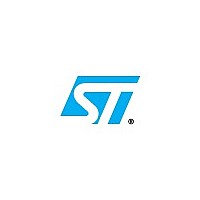ST92196A STMicroelectronics, ST92196A Datasheet - Page 190

ST92196A
Manufacturer Part Number
ST92196A
Description
8/16-bit Mcu For Tv Applications With Up To 96k Rom, On-screen-display And 1 Or 2 Data Slicers
Manufacturer
STMicroelectronics
Datasheet
1.ST92196A.pdf
(268 pages)
Available stocks
Company
Part Number
Manufacturer
Quantity
Price
Company:
Part Number:
ST92196A2B1/JPC
Manufacturer:
ST
Quantity:
188
Company:
Part Number:
ST92196A4B1
Manufacturer:
ST
Quantity:
1 566
- Current page: 190 of 268
- Download datasheet (4Mb)
SERIAL PERIPHERAL INTERFACE (Cont’d)
8.10.9 Register Description
It is possible to have up to 3 independent SPIs in
the same device (refer to the device block dia-
gram). In this case they are named SPI0 thru
SPI2. If the device has one SPI converter it uses
the register adresses of SPI0. The register map is
the following:
Note: In the register description on the following
pages, register and page numbers are given using
the example of SPI0.
SPI DATA REGISTER (SPIDR)
R253 - Read/Write
Register Page: 0
Reset Value: undefined
Bit 7:0 = D[0:7]: SPI Data .
This register contains the data transmitted and re-
ceived by the SPI. Data is transmitted bit 7 first,
and incoming data is received into bit 0. Transmis-
sion is started by writing to this register.
Note: SPIDR state remains undefined until the
end of transmission of the first byte.
SPI CONTROL REGISTER (SPICR)
R254 - Read/Write
Register Page: 0
Reset Value: 0000 0000 (00h)
Bit 7 = SPEN: Serial Peripheral Enable .
0: SCK and SDO are kept tristate.
SPEN
D7
7
7
SPIDR1 R253
SPICR1 R254
SPIDR2 R245
SPICR2 R246
SPIDR R253
SPICR R254
Register
BMS
D6
ARB
D5
BUSY
D4
SPIn
SPI0
SPI0
SPI1
SPI1
SPI2
SPI2
CPOL
D3
CPHA
D2
SPR1
Page
D1
0
0
7
7
7
7
SPR0
D0
0
0
1: Both alternate functions SCK and SDO are ena-
Note: furthermore, SPEN (together with the BMS
bit) affects the selection of the source for interrupt
channel B0. Transmission starts when data is writ-
ten to the SPIDR Register.
Bit 6 = BMS: S-bus/I
0: Perform a re-initialisation of the SPI logic, thus
1: Enable S-bus/I
Note: when the BMS bit is reset, it affects (togeth-
er with the SPEN bit) the selection of the source
for interrupt channel B0.
Bit 5 = ARB: Arbitration flag bit.
This bit is set by hardware and can be reset by
software.
0: S-bus/I
1: Arbitration lost by the SPI in S-bus/I
Note: when ARB is set automatically, the SDO pin
is set to a high value until a write instruction on
SPIDR is performed.
Bit 4 = BUSY: SPI Busy Flag .
This bit is set by hardware. It allows the user to
monitor the SPI status by polling its value.
0: No transmission in progress.
1: Transmission in progress.
Bit 3 = CPOL: Transmission Clock Polarity .
CPOL controls the normal or steady state value of
the clock when data is not being transferred.
Please refer to the following table and to
to see this bit action (together with the CPHA bit).
Note: As the SCK line is held in a high impedance
state when the SPI is disabled (SPEN = “0”), the
SCK pin must be connected to V
through a resistor, depending on the CPOL state.
Polarity should be set during the initialisation rou-
tine, in accordance with the setting of all peripher-
als, and should not be changed during program
execution.
- SERIAL PERIPHERAL INTERFACE (SPI)
bled.
allowing recovery procedures after a RX/TX fail-
ure.
nization and Start/ Stop detection (SPI used in
an S-bus/I
mode.
2
C-bus stop condition is detected.
2
C-bus protocol).
2
C-bus arbitration, clock synchro-
2
C-bus Mode Selector .
SS
or to V
Figure 81
190/268
2
C-bus
CC
Related parts for ST92196A
Image
Part Number
Description
Manufacturer
Datasheet
Request
R

Part Number:
Description:
STMicroelectronics [RIPPLE-CARRY BINARY COUNTER/DIVIDERS]
Manufacturer:
STMicroelectronics
Datasheet:

Part Number:
Description:
STMicroelectronics [LIQUID-CRYSTAL DISPLAY DRIVERS]
Manufacturer:
STMicroelectronics
Datasheet:

Part Number:
Description:
BOARD EVAL FOR MEMS SENSORS
Manufacturer:
STMicroelectronics
Datasheet:

Part Number:
Description:
NPN TRANSISTOR POWER MODULE
Manufacturer:
STMicroelectronics
Datasheet:

Part Number:
Description:
TURBOSWITCH ULTRA-FAST HIGH VOLTAGE DIODE
Manufacturer:
STMicroelectronics
Datasheet:

Part Number:
Description:
Manufacturer:
STMicroelectronics
Datasheet:

Part Number:
Description:
DIODE / SCR MODULE
Manufacturer:
STMicroelectronics
Datasheet:

Part Number:
Description:
DIODE / SCR MODULE
Manufacturer:
STMicroelectronics
Datasheet:

Part Number:
Description:
Search -----> STE16N100
Manufacturer:
STMicroelectronics
Datasheet:

Part Number:
Description:
Search ---> STE53NA50
Manufacturer:
STMicroelectronics
Datasheet:

Part Number:
Description:
NPN Transistor Power Module
Manufacturer:
STMicroelectronics
Datasheet:

Part Number:
Description:
DIODE / SCR MODULE
Manufacturer:
STMicroelectronics
Datasheet:











